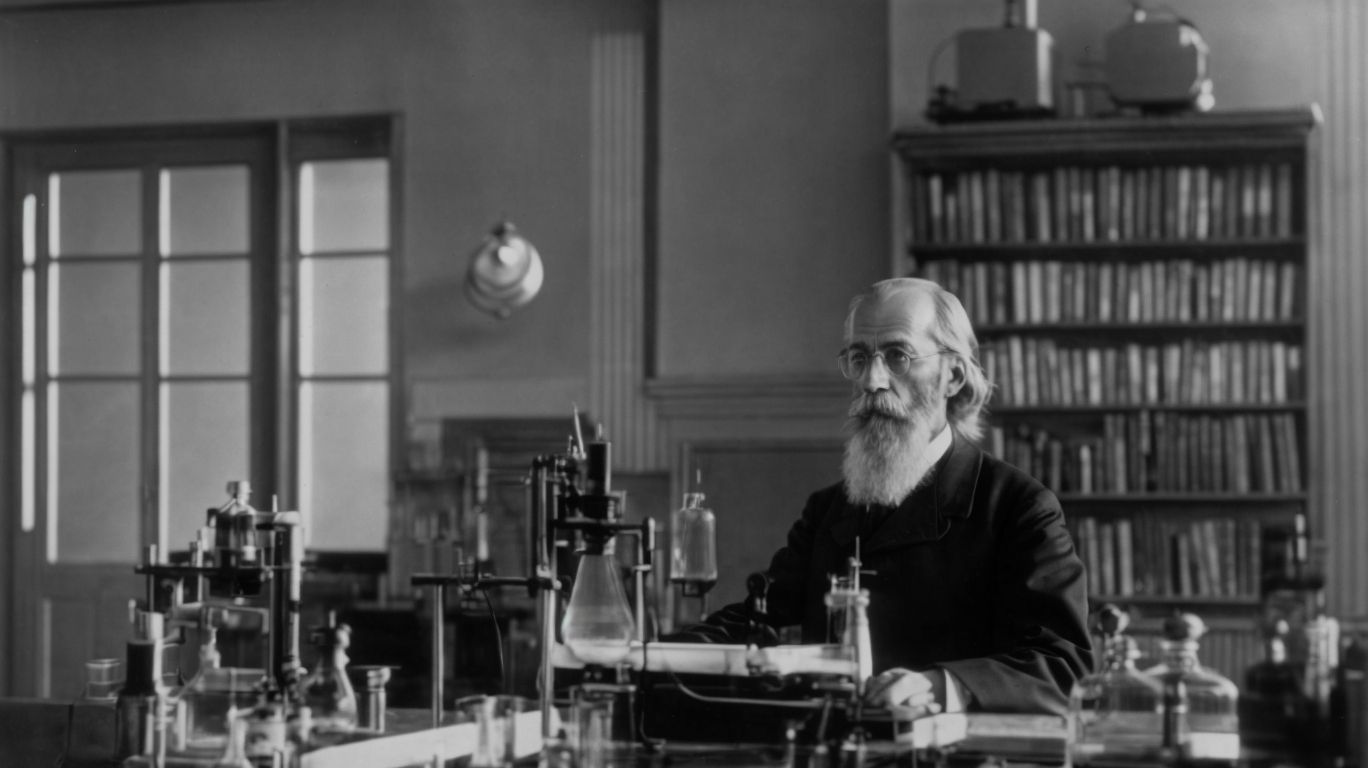Wilhelm Wundt is often hailed as the father of modern psychology, but who was he really, and what led to his groundbreaking contributions to the field? Before Wundt, what were the main theories shaping psychology, and why is his work considered so influential?
From the establishment of the first experimental psychology laboratory to the development of introspection as a method of study, Wundt’s impact on modern psychology is undeniable. Join us as we explore the life, work, and lasting legacy of this pioneering figure in psychology.
Contents
- 1 Who Was Wilhelm Wundt?
- 2 What Was the Historical Context of Psychology Before Wundt?
- 3 Why Is Wundt Considered the Father of Modern Psychology?
- 4 What Was Wundt’s Contribution to the Field of Psychology?
- 5 How Did Wundt’s Ideas Influence the Development of Modern Psychology?
- 6 What Were the Criticisms of Wundt’s Work?
- 7 How Did Wundt’s Work Shape the Future of Psychology?
- 8 Frequently Asked Questions
- 8.1 What was Wilhelm Wundt’s contribution to the field of psychology?
- 8.2 When did Wilhelm Wundt establish the first psychological laboratory?
- 8.3 What was the main focus of Wilhelm Wundt’s research?
- 8.4 How did Wilhelm Wundt’s work influence the development of psychology?
- 8.5 What is the significance of Wilhelm Wundt’s book, “Principles of Physiological Psychology”?
- 8.6 How did Wilhelm Wundt’s work impact the study of other disciplines?
Who Was Wilhelm Wundt?
Wilhelm Wundt, known as the father of experimental psychology, was a German psychologist who established the first psychology laboratory in 1879.
Wundt’s background reveals his deep interest in understanding the human mind and behavior, leading to his groundbreaking work in the field of psychology. His contributions to psychology are vast, including his focus on introspection, which allowed individuals to examine and report their own thoughts and feelings. This approach laid the foundation for modern psychological research methods. The establishment of his experimental psychology laboratory marked a pivotal moment in the history of psychology.
This laboratory became the birthplace of psychology as a separate scientific discipline, influencing generations of psychologists. Wundt’s emphasis on using experimental methods to study mental processes revolutionized the field by shifting the focus from mere philosophy to empirical research. The laboratory provided a structured environment for conducting controlled experiments, enabling researchers to explore psychological phenomena systematically.
What Was the Historical Context of Psychology Before Wundt?
Before Wilhelm Wundt, psychology had diverse theoretical foundations, including behaviorism, structuralism, functionalism, and Gestalt psychology.
Behaviorism, believed in by well-known figures like John B. Watson and B.F. Skinner, focused on observable behaviors and believed that they could be studied scientifically without the need to delve into the mind’s inner workings.
- Structuralism, championed by Edward B. Titchener, aimed to understand the structure of the mind through introspection, breaking down mental experiences into their basic components like sensations and feelings.
- Functionalism, spearheaded by William James, shifted focus towards studying the mind’s adaptive functions in helping individuals adapt to their environment and circumstances.
On the other hand, Gestalt psychology, led by Max Wertheimer and his colleagues, emphasized the holistic nature of mental experiences, focusing on how humans perceive and organize sensory information into meaningful Gestalts, or wholes.
What Were the Main Theories of Psychology Before Wundt?
Psychology before Wundt was influenced by various theories such as structuralism focusing on conscious experience, functionalism emphasizing mental activities’ purpose, and behaviorism examining observable behavior.
Structuralism, led by Wilhelm Wundt’s predecessors like Edward Titchener, sought to study the structure of the mind through introspection. In contrast, functionalism, championed by William James, highlighted how the mind adapts to its environment and the functions of mental processes. Moving on to behaviorism, initiated by John B. Watson and later shaped by B.F. Skinner, it emphasized the importance of observable behaviors and how they can be conditioned. Notably, Freud’s psychoanalytic theory delved into the unconscious mind and its influence on behavior.
Why Is Wundt Considered the Father of Modern Psychology?
Wilhelm Wundt is hailed as the father of modern psychology due to his pioneering work in understanding consciousness, behavior, and laying the foundation for cognitive psychology.
Wundt’s establishment of the first psychology laboratory in Leipzig, Germany, in 1879 marked a significant turning point in the field. Through his experimental methods, he sought to understand the structure of the mind by breaking down mental processes into basic elements, a concept known as structuralism. This approach laid the groundwork for future psychological research and emphasized the importance of empirical observation and measurement.
Wundt’s emphasis on introspection, where individuals carefully observe and report their own thoughts and emotions, contributed to the development of psychology as a scientific discipline. By encouraging systematic self-observation, Wundt paved the way for studying mental processes objectively.
What Was Wundt’s Contribution to the Field of Psychology?
Wilhelm Wundt made significant contributions to psychology through the establishment of the first experimental psychology laboratory, introduction of structuralism, and development of introspection as a method of studying mental processes.
Wundt’s work marked a pivotal moment in the history of psychology, shifting the focus from philosophical speculation to empirical observation. His laboratory at the University of Leipzig became a hub for groundbreaking research, where he emphasized the importance of controlled experiments in understanding human behavior.
Structuralism, a school of thought pioneered by Wundt, aimed to analyze the basic elements of consciousness and how they combine to form complex mental experiences. Through introspection, Wundt encouraged individuals to observe and report their own thoughts and feelings, laying the foundation for modern psychology.
Establishment of the First Experimental Psychology Laboratory
One of Wundt’s groundbreaking contributions was the establishment of the first experimental psychology laboratory, where he conducted experiments to understand principles of mental processes in response to stimuli.
Wundt’s experimental psychology laboratory paved the way for a systematic study of human consciousness and perception. His research methods included introspection, which involved having participants reflect on their thoughts and sensations in response to specific stimuli. By analyzing these subjective experiences, he aimed to uncover fundamental principles underlying human cognition. Wundt explored various aspects of mental processes such as sensation, perception, and reaction time, contributing significantly to the development of psychology as a distinct scientific discipline.
Introduction of Structuralism
Wundt’s introduction of structuralism emphasized the analysis of conscious experience and mental activities, paving the way for a deeper understanding of human cognition.
This approach stressed the importance of breaking down mental processes into basic components to explore the underlying elements of human thought. By focusing on introspection and self-reflection, Wundt sought to unravel the complexities of the human mind. The concept of structuralism revolutionized the field of psychology by shifting the focus from subjective feelings to systematic observation and analysis. Through this methodology, psychologists could delve into the intricacies of perception, memory, and thought, laying the groundwork for future advancements in cognitive psychology.
Development of Introspection as a Method of Study
Wundt’s development of introspection as a method of study allowed researchers to explore mental processes and observable behavior through systematic self-reporting.
Introspection involved individuals reflecting on their thoughts, feelings, and perceptions, aiming to provide insight into their inner experiences. Wundt believed that by breaking down conscious thoughts into basic components, one could understand the structure of the mind. This method marked a significant shift towards the scientific study of the mind, establishing the foundation for modern psychology. Introspection paved the way for researchers to investigate the complexities of human consciousness and behavior, diving into the subjective aspects of cognition and emotion.
How Did Wundt’s Ideas Influence the Development of Modern Psychology?
Wundt’s ideas shaped modern psychology by influencing the emergence of functionalism, the rise of behaviorism, and impacting contemporary psychological research methods.
Wundt’s emphasis on introspection and structuralism laid the foundation for functionalism, a psychological perspective that shifted the focus from the structure of the mind to its functions and purposes.
His experimental methods paved the way for behaviorism, a school of thought that concentrated on observable behaviors and rejected the emphasis on internal mental processes.
Wundt’s commitment to systematic observation and empirical research greatly influenced contemporary psychological research methodologies, advocating for objective measurement and scientific rigor in studying human behavior and cognition.
The Emergence of Functionalism
Wundt’s ideas paved the way for functionalism, which emphasized the study of consciousness, responses to stimuli, and experimental methods to understand mental processes.
Functionalism, as developed further by psychologists such as William James, delved deep into how the mind adapts to its environment and focuses on the practical application of mental processes in everyday life. By acknowledging the importance of individual differences and the interplay between thoughts, feelings, and behavior, functionalism brought a new perspective to the field of psychology.
This shift in focus also led to the development of innovative experimental techniques and methodologies, revolutionizing the way psychologists approached the study of human behavior. It marked a transition from structuralism to a more dynamic and holistic understanding of mental processes, shaping the modern landscape of psychology.
The Rise of Behaviorism
Wundt’s influence led to the rise of behaviorism, emphasizing classical and operant conditioning, reinforcement, and the study of observable behavior in understanding human actions.
His pioneering work laid the foundation for behaviorism, influencing notable psychologists like Pavlov, Watson, and Skinner. Classical conditioning theories, such as Pavlov’s experiments with dogs, showcased how associations between stimuli and responses shape behavior.
Wundt’s emphasis on observable behavior led to the development of operant conditioning by B.F. Skinner. This perspective highlighted the role of reinforcement in shaping behavior through rewards and punishments.
By focusing on measurable actions, behaviorism revolutionized psychology, shifting the focus from internal mental processes to external behaviors, sparking a new era of scientific inquiry into human actions.
Impact on Modern Psychological Research Methods
Wundt’s influence on modern psychological research methods catalyzed the cognitive revolution, leading to advancements such as brain imaging techniques for studying perception, memory, and decision-making.
This shift towards a more scientific and experimental approach brought about significant changes in how psychologists approached the study of human cognition. Wundt’s emphasis on introspection as a method for examining mental processes paved the way for the development of novel research techniques aimed at understanding the complexities of human thought.
As a result, researchers began to utilize sophisticated brain imaging technologies like fMRI and PET scans to explore the neural mechanisms underlying cognitive functions. These innovations allowed for a deeper understanding of how different brain regions contribute to perception, memory formation, and decision-making processes.
What Were the Criticisms of Wundt’s Work?
Critics pointed out limitations in Wundt’s work, including concerns about scientific rigor, the generalizability of findings, and the oversight of cultural and environmental influences.
Scientific rigor was a significant point of contention as critics argued that Wundt’s experimental methods lacked the precision and control needed for truly objective results. This led to doubts about the reliability and validity of his research. There were doubts about the generalizability of his findings, with critics questioning whether the principles derived from studies in controlled laboratory settings could be applied to diverse real-world contexts.
Critics accused Wundt of neglecting the influence of cultural and environmental factors on human behavior. They argued that his focus on individual internal processes overlooked the impact of societal norms, historical context, and external stimuli on psychological phenomena.
Lack of Scientific Rigor
One criticism of Wundt’s work was the perceived lack of scientific rigor, with critics calling for more structured experimentation and rigorous publication standards like peer-reviewed studies.
Several scholars in the field emphasized the need for Wundt to adopt a more systematic approach in his research, highlighting the significance of adhering to stringent methodologies to ensure replicability and reliability. The absence of detailed protocols in his experiments raised concerns about the accuracy and generalizability of his findings. Advocates pushed for a shift towards more controlled settings, standardized measurement tools, and increased transparency in reporting results to enhance the credibility of his work.
Limited Generalizability of Findings
Another critique of Wundt’s work was the limited generalizability of his findings, prompting discussions on ethical standards and the need for adherence to guidelines like those set by the APA.
One major concern raised was the extent to which Wundt’s findings could be applied beyond the specific context of his experiments, raising doubts about their universality. Critics argued that the controlled laboratory settings in which Wundt conducted his research might not accurately reflect real-world conditions, thus limiting the practical application of his results.
Questions were raised regarding the ethical considerations surrounding Wundt’s methodologies. The push for standardized practices such as those outlined by the American Psychological Association (APA) was emphasized to ensure that research involving human subjects meets the necessary ethical guidelines.
Ignoring the Role of Culture and Environment
Critics highlighted Wundt’s oversight of the role of culture and environment in psychological research, underscoring the importance of considering social issues and biopsychological factors.
Wilhelm Wundt, the father of experimental psychology, primarily focused on structuralism, diving into the analysis of conscious mental processes.
His approach often overlooked the influences of culture and environment on human behavior, which led to criticisms regarding the limitations of his research scope.
Addressing social issues such as inequality, prejudice, and accessibility is crucial in understanding the complexities of human behavior in various contexts.
How Did Wundt’s Work Shape the Future of Psychology?
Wundt’s work laid the groundwork for the future of psychology by fostering an eclectic approach to studying human behavior and inspiring the development of various specialty areas within the field.
This eclectic approach influenced psychologists to consider a wide range of perspectives and methodologies in their research, leading to a more comprehensive understanding of human cognition and behavior. As a result, the field of psychology began to diversify into specialized areas such as developmental psychology, cognitive psychology, and clinical psychology, each focusing on specific aspects of human experience and behavior.
Frequently Asked Questions
What was Wilhelm Wundt’s contribution to the field of psychology?
Wilhelm Wundt is considered the founder of modern psychology. He established the first psychological laboratory, and his emphasis on the scientific study of human behavior paved the way for the development of modern psychology as a discipline.
When did Wilhelm Wundt establish the first psychological laboratory?
Wilhelm Wundt established the first psychological laboratory at the University of Leipzig in 1879. This marked the birth of modern psychology as a scientific discipline.
What was the main focus of Wilhelm Wundt’s research?
Wilhelm Wundt’s main focus was on the study of consciousness. He believed that by breaking down conscious experiences into smaller elements, one could understand the underlying structure of the mind.
How did Wilhelm Wundt’s work influence the development of psychology?
Wilhelm Wundt’s emphasis on scientific methods and experimentation laid the foundation for the development of modern psychology. His work also influenced the emergence of different schools of thought, such as structuralism and functionalism.
What is the significance of Wilhelm Wundt’s book, “Principles of Physiological Psychology”?
Wilhelm Wundt’s book, “Principles of Physiological Psychology”, is considered a landmark publication in the history of psychology. It outlined his theories and experimental methods and solidified his role as the founder of modern psychology.
How did Wilhelm Wundt’s work impact the study of other disciplines?
Wilhelm Wundt’s approach to studying the mind and human behavior had a significant impact on other disciplines, such as philosophy, sociology, and anthropology. His work also led to the development of new fields within psychology, such as social psychology and child psychology.



